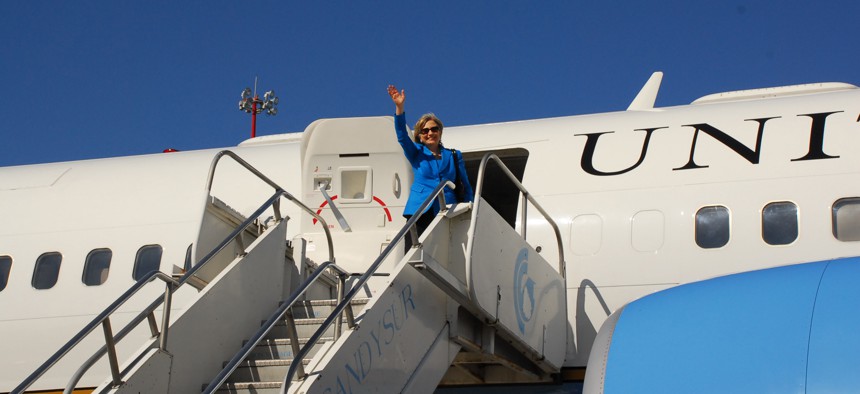
Clinton waves goodbye before lifting off from Montevideo, Uruguay in 2010. State Department file photo
Why Hillary Clinton Is Underwater
It was inevitable that her numbers would drop once she became a real candidate. But will they keep falling?
Hillary Clinton announced her presidential candidacy roughly eight weeks ago, and since then, a few things have become apparent.
On the positive side for her, she has put together a first-class team of professionals, a blending of some of the younger people from her 2008 campaign who have gone on to impressive careers since then, a second group of very talented pros from the Obama 2008 and 2012 campaigns, and a third, smaller group of inner-circle folks from Hillaryland to create a comfort zone—familiar faces that know and understand her, and vice versa. Her campaign launch seemed quite successful and designed to draw a contrast with the royal trappings of her previous presidential effort.
On the negative side, a decision was made early on—by whom, it is not clear—to keep the media at a distance, to make her generally unavailable for questions. As predictable as the sun coming up in the east, this resulted in several weeks of sustained negative coverage emphasizing the arrogance and aloofness of her candidacy and campaign. This was precisely what the carefully planned and executed launch and rollout was designed to prevent. At one point, counts were publicized of how many days it had been since she had last answered a media question, and there were even counts of total questions answered since her announcement. And there was the factoid that her husband, whose political career is over, had answered more media questions than the current presidential contender. In reporters' minds, a candidate can never be accessible enough; they would prefer that all candidates and elected officials be permanently hooked with a sodium-pentothal drip. Given that Hillary Clinton has a pretty nimble mind and is less accident-prone than most candidates, the strategy invited negative coverage and undercut the central message that the campaign was trying to convey.
While stories about her State Department emails dominated the early news for awhile, there is little evidence that they had an appreciable impact on Democratic voters—or for that matter, general-election swing voters. Subsequent coverage that raised questions about Clinton Foundation fundraising and the correlation between her husband's speeches, foundation contributions, and decisions during her tenure at the State Department does appear to have taken its toll on her numbers.
ust a cursory look at Clinton's favorable and unfavorable ratings over the last four years reveals a ski slope largely of plunges and plateaus, a pattern that would lead any Democrat to reach for the antacids. Take a look at The Huffington Post's Pollster.com graphs. During her post-2008 campaign tenure as secretary of State, Clinton's favorable ratings were typically between 57 and 62 percent, with unfavorable figures between 32 and 35 percent. For a polarizing figure like Clinton, that is as good as it gets. But because she was not seen in a political context during this period, those numbers were probably unrealistically high. Then, over a 13-month period from November 2012 through December 2013, her favorable numbers slipped down to roughly 50 percent with unfavorable rising to about 43 percent.
Part of this was fallout from the attack in Benghazi, but that incident largely drew the wrath of conservatives and Republicans. More importantly, Clinton began to be seen once again in a political rather than a diplomatic context. The gap has narrowed more and now, most polls show her, in pollster jargon, upside down or underwater, with favorables down to 46 percent and unfavorables up above 48 percent.
While these numbers are not ones that partisans want to see for their candidate, something in this ballpark is probably inevitable for a well-known and well-defined candidate in this increasingly polarized and partisan environment. Your side largely likes you, the other side hates you, and independents have decidedly mixed views. But the way Clinton and her campaign handle things will make a big difference on whether she stays on the sunny or shady side of that equilibrium, with favorables higher or lower than unfavorables.
One central question that both Clintons are going to have to confront is: How important is it to them that she be elected president? When you are in a hole, stop digging. If her election is really important to them, and I suspect it is, he is going to have to stop giving paid speeches and slow down all Clinton Foundation and Global Initiative fundraising, limiting it to only the pristine and totally defensible contributions. He'll also need to do a better job of communicating the good works that the Clinton Foundation and Global Initiative do. (Right now, it's being cast as the Clintons' personal piggy bank and slush fund.) Hillary Clinton has to come across as more open and approachable, and she has to stop giving journalists so many easy shots to make her look bad. Contrary to what most conservatives believe, the vast majority of reporters have not been in the tank for the Clintons since the mid-1990s, and many rather enjoy taking shots at them. A certain amount of that is inevitable, but why invite bad stories and encourage hostility?
Right now, Democrats seem mostly OK with putting all of their eggs in the Clinton basket, though concerns are growing as to the durability of the basket. But the Clintons should not mistake Democrats getting in line for them as falling in love.






